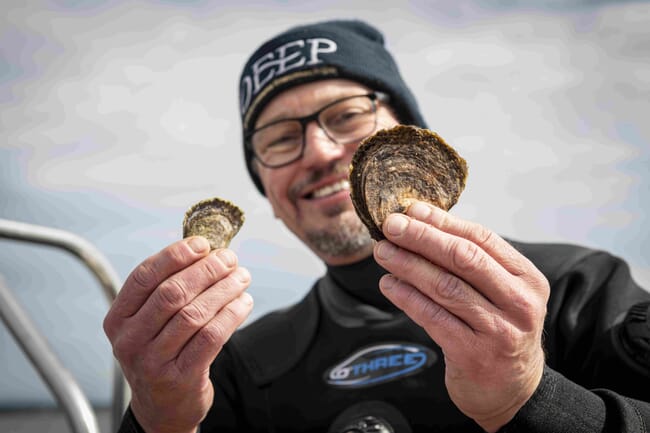
This month marks the 20,000th native European oyster being released into the Dornoch Firth, where they became extinct more than 100 years ago as a result of overfishing. The reintroduction programme aims pave the way for the restoration of the reef, after years of research, planning and monitoring.
As part of the DEEP project, researchers are now researching the carbon value of the calcium carbonate produced in the shell of native oysters, a key component in estimating the total value of the reef’s carbon storage potential.
Conscious of the organic waste discharge from its distillery in Tain, Glenmorangie says it has long understood the need for a water quality enhancement strategy, while supporting the marine environment at its brand home on the banks of the Dornoch Firth.
DEEP began, as part of the distillery’s wider sustainability strategy, in 2014, with partners from Heriot-Watt University and supported by the Marine Conservation Society, with a vision to create a sustainable reef of 4 million native oysters.
The oysters will play a key role in purifying the water which contains organic by-products from the distillery and the local area, with one oyster able to purify up to 200 litres of water a day. The distillery’s anaerobic digestion (AD) plant, commissioned in 2017, has already successfully reduced its biological load on the firth by over 95 percent, and in a distillery first, the oyster reef is expected to absorb the remaining 5 percent. In addition to the water purification role the oyster reef also creates a haven for marine life and will help to mitigate the effects of climate change.
Professor Bill Sanderson, from Heriot-Watt University, said: “DEEP has allowed us to demonstrate the many benefits of restoration of long-lost reefs, and carbon storage is yet another exciting outcome of the research for the project.
“We are still uncovering exactly how much of a game changer this can be but we’re increasingly focusing our research on delving deeper into the role of the oyster reef as a carbon store.”
“It’s great to think that the Dornoch Firth can contribute as a global exemplar for helping to mitigate climate change, especially as we run up to COP26 being held here in Scotland.”
Professor John Baxter, chair of DEEP’s independent research advisory panel, comprising scientists from the IUCN, The Marine Biological Association UK and the Native Oyster Restoration Alliance, added: “The DEEP research is greatly improving our understanding of the dynamics of oyster reef restoration. It is also helping to set the standard in all aspects of marine habitat restoration work such as biosecurity and monitoring. As we embark on the UN Decade on Ecosystem Restoration (2021-2030) DEEP is a prime example of the multiple benefits (ie habitat improvement, biodiversity enhancement and climate change mitigation) that can come from such initiatives.”
Thomas Moradpour, CEO and president at The Glenmorangie Company commented: “DEEP continues to deliver leading research into vital areas that affect us all as we continue on the journey to a ‘net zero’ world.
“Today’s businesses must all play their part, not just to protect the environment in which they operate, but to enhance it, leaving it in better shape for the next generation.”



